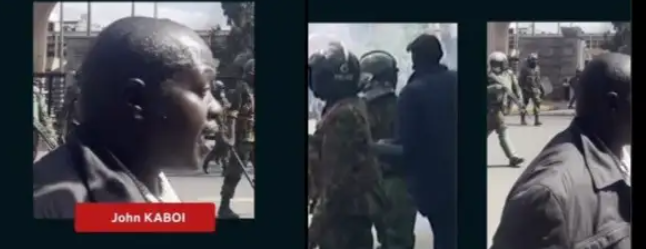A recent video uploaded by BBC on their YouTube channel has shed light on serious allegations involving police officers during the recent protests in Kenya. In their detailed 37-minute documentary, BBC revealed possible involvement of police officers in the shooting of innocent protesters.
Through the analysis of more than 100 videos and photos collected during the protests, BBC was able to piece together what could have happened on those chaotic days. The footage shows disturbing scenes where peaceful demonstrators were met with brutal force, and BBC’s careful breakdown points to specific officers who might have been responsible.
One of the most shocking revelations in the video is the identification of officers possibly involved in the shooting of Eric Shieni and other unarmed Kenyans. BBC did not just rely on one video but used multiple angles and recordings to trace actions and movements of the police on the ground.
They were able to point out where some officers may have received their orders from, suggesting that the violence was not random but possibly directed from higher command levels.
According to the BBC investigation, a police officer named John Kaboi may have been the one who gave the chilling shoot-to-kill orders. In one particular video taken during the protests, Officer Kaboi can clearly be heard shouting “Ua hao,” which means “kill them” in English.
This order has raised serious concerns about the use of deadly force against civilians who were exercising their right to protest. The video evidence paints a grim picture of how state forces might have turned against their own people instead of protecting them.
BBC also mentioned two other suspects. One was a police officer who has not yet been fully identified but was recognized by the gear he wore during the protests. This officer is suspected of shooting down two unarmed Kenyans. The second suspect was identified as a Kenya Defence Forces (KDF) officer.

The KDF officer is accused of taking the life of a University of Nairobi student named Shieli as the protesters were retreating from Parliament buildings. These allegations, if true, show a worrying involvement of not just regular police but even military personnel in the violent suppression of protests.
Interestingly, BBC reported that the government of Kenya refused to participate in the making of the documentary. They did not provide comments or responses to the questions raised during the investigation.
Similarly, the police officer suspected of giving the deadly orders, John Kaboi, also refused to comment when approached. The silence from both the government and the accused officers has only added to the growing anger and mistrust among the public. Many Kenyans are now demanding justice and accountability for the lives lost during the protests.


